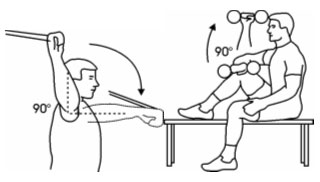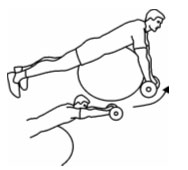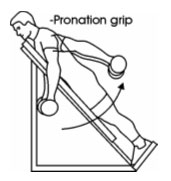sportfactoryMatt Russ has coached and trained elite athletes from around the country and internationally for over ten years. He currently holds expert licenses from USA Triathlon, USA Cycling, and is a licensed USA Track and Field Coach. Matt is head coach and owner of The Sport Factory, and works with athletes of all levels full time. He is a free lance author and his articles are regularly featured in a variety of magazines and websites.
Preventing Swimmer’s Shoulder
Poor swim technique, overtraining, unilateral breathing, overuse of training equipment all can cause swimmer's shoulder. Read how to avoid injury and strengthen your muscles.
By Jen Adley



Swimmer’s shoulder is an inflammatory condition caused by the mechanical impingement of soft tissue between the acromion and the corocoid process of the scapula (also known as the coracoacromial arch). Repetitive overhead arm motion of the freestyle stroke can cause this overuse injury, but there are ways to prevent this type of impingement.
Poor swimming technique is a major contributor to shoulder pain. If a swimmer crosses mid-line upon hand-entry, this may cause impingement of the long head of the biceps tendon. If a swimmer's hand enters the water with the thumb pointing down and the palm facing outwards, this can result in the same type of impingement. By addressing proper entry, this condition may be avoided.
Overtraining can lead to shoulder inflammation and pain. If the swimmer continues to swim with fatigued muscles, the condition may worsen. As the muscles fatigue they work less efficiently, which has two undesirable consequences. First, the muscles will have to work harder in a weakened condition. Second, the swimmer will have to perform more strokes to cover the same distance, which again overuses already fatigued muscles, perpetuating the cycle. Combined, these two factors can result in swimmer's shoulder.
Unilateral breathing may also cause swimmer's shoulder. Swimmers that consistently turn their heads to one side are risking shoulder pain in the opposite shoulder. This shoulder has to work harder to support forward movement with the head turned to the side. Bilateral breathing transfers this load to both arms.
Overuse of training equipment may cause shoulder pain. Using hand paddles that are too large places great strain on the shoulder muscles during the pull-through phase of freestyle. Using a kickboard with arms fully extended in front of the swimmer can place the shoulder in a position of impingement. The more often or longer the swimmer uses these devices, or uses them incorrectly, the greater the risk of shoulder impingement.
Swimmers should avoid rapid increases in training distances or frequency of training, as this is likely to over fatigue the shoulder muscles leaving them at risk for impingement and shoulder pain.
Strengthening shoulder and upper back muscles and stretching shoulder, chest, and neck muscles will help to prevent a swimming posture that is conducive to impingement. The muscle imbalance and inflexibility that typically occurs in swimmers contributes greatly to impingement. The following exercises and stretches will address these areas specifically.
The external rotators of the rotator cuff muscles play a crucial role in shoulder stability. These muscles are also inherently weak, and are often the cause of rotator cuff impingement. By strengthening this group, you will have a more stable shoulder joint.
This exercise promotes stability in the scapular region and prevents muscle imbalance associated with swimming. These muscles promote postural alignment and aid in shoulder stability. In swimmers they often become lengthened.
This exercise strengthens the rear deltoid and mid back. Swimmers often have shortened pectorals and front deltoids causing a shoulder joint that internally rotates. By strengthening the muscles of the back and rear deltoid, you maintain a more neutral shoulder.
Click on star to vote